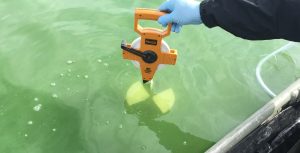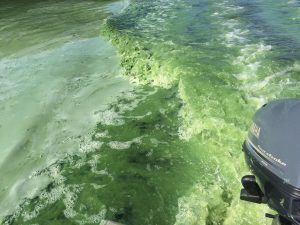This summer there have been numerous reports of blue green algae blooms across the country and New England. High levels of blue green algae (which are technically cyanobacteria) are linked to numerous health concerns for people and can be even more dangerous for animals and pets. Toxins found in some species of blue green algae can cause gastro-intestinal issues, liver problems, skin rashes, and damage to the nervous system. Animals and pets that drink water with high concentrations of blue green algae are the most susceptible to these issues.
Most health problems associated with blue green algae are seen when there are very high levels in the water. Lakes with these elevated concentrations are noticeably green and, it if is really bad, take on the look and consistency of pea soup.

LEA does routine monitoring on our lakes throughout the year and one of the components we look at is a pigment called phycocyanin. This pigment is found in blue green algae and thankfully we have very low levels of it in our area. Thus, it is unlikely to have heath issues related to blue green algae in our area right now. If there was a concern, we would notify the public and our members.
One of the reasons our lakes and ponds are in such good shape is because of the forested watersheds that surround them. Wooded watersheds filter and clean stormwater before it enters the water. Buffers around the shoreline, which are the lake’s last line of defense, are also in good shape thanks to landowners who steward their property and shoreland zoning rules that protect the most sensitive areas.

If you are near water that looks visibly green from algae, you should be cautious about swimming or allowing your pets near the water. The blue green algae that we are most concerned about is usually well mixed in the water column and does not look like small green clouds of floating cotton candy (these “clouds” are a type of algae called metaphyton which are not generally associated with health risks). If you are concerned that you are seeing a blue green algae bloom on your lake or pond, please contact our offices at 207-647-8580.